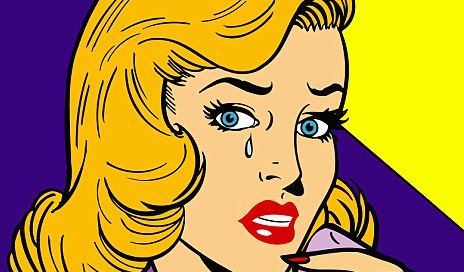Men are more emotional at work - but women are the ones punished for being emotional...
The economic cost of telling women they are "too much"
A male friend of mine once threw an epic fit at work. He shouted at his editor for over an hour about the placement of a semicolon. The whole newsroom was watching.
Now there are two things I admire about this episode. First of course that my friend knows about semicolons. I personally still don’t know how to use them. (My wonderful English translator Alex Fleming put a lot of semicolons into my forthcoming book “Mother of Invention” when she translated it from Swedish. I had to ask her to take them all out. It didn’t feel authentic).
The second thing I admire is the sheer PASSION that my male friend showed. There is undoubtedly something deliciously heroic about shouting at your editor for an hour about a semicolon.
Most women wouldn’t do it.
This is because omen are disproportionally suffering from THE TYRANNY OF CHILL in society.
It’s a problem.
Last week Elizabeth Day wrote a column about how she recently found herself on a Zoom-call getting carried away by her own enthusiasm. She was waving her hands, gushing and generally not playing it cool AT ALL.
Afterwards she felt bad. She worried that she had been “too much”?
Society insists that women rein in their passion and enthusiasm. Please don’t use your uncensored voice or (even worse!) let it communicate through your body. There are even helpful articles in The Harvard Business Review on “How Women Can Show Passion at Work Without Seeming Emotional”.
This stuff is REAL.
A review of employee feedback surveys on 1100 female executives showed that when women expressed passion for an idea in meetings, their male counterparts perceived them as being “too emotional”. The authors of “Constrained by Emotion: Women, Leadership, and Expressing Emotion in the Workplace” write:
“Both men and women are held to norms of appropriate emotional expression in the workplace, but emotional expressions by women tend to come under greater scrutiny than those by men.”
Women know this. So women dial themselves back. And then it ends up hurting their careers…
- Yes, she is really competent, but she’s not very visionary…
That’s what is often said about female candidates for leadership position.
- Yes she really knows her stuff but we need someone with VISION. Let’s pick this guy who is really good at making audacious statements in meetings…
It seems like women simply can’t win. Kathryn Heath and Jill Flynn who have studied the phenomenon have written that when women do sell an idea with visible passion people don’t see them as “visionary”. Instead male colleagues or managers will say things like: “She was too hyped up”…
The whole thing is particularly ironic because research shows that men are actually the ones who are more emotional at work. Here we are back with my male friend shouting at his editor about that semicolon…
A study by Anglia Ruskin University last year revealed men to be more emotionally invested at work and twice as likely as women to take criticism personally or get upset if their ideas were ignored. Men were also 20 percent more likely to take drastic action fuelled by emotions. 43 percent of men admitted to shouting.
But no it’s women who are “too emotional” to get promoted…
We all know why:
When a man storms out of the room, he’s passionate.
When a woman storms out of the room, she’s “unstable”.
This dynamic is then magnified for women of colour who express an even bigger need to self-censor in order to not be perceived as “too much”.
The question is: What does all of this cost us?
In 1983 Arlie Russell Hochschild coined the term “emotional labor”. She had done a study on flight attendants: people whose job it is to smile even if they do not feel like smiling. That’s emotional labor: “the management of feelings to display a publicly observable facial and bodily display”. Emotional labor plays an important role in the economy. It’s also something women are required to do to a larger extent than men.
It can lead to occupational hazard. Hochschild found that her flight attendants could become estranged both from their own expressions of feeling, and from what they actually felt.
This happens to women a lot.
Emotions are “feminine “ and everything feminine is basically “too messy”, “too unknown”, “too irrational”, “too difficult”, “too chaotic “and “too much work”…
So we shut it down.
Become like the flight attendants.
Pleasant.
But never “too much”. If I were Brené Brown I’d say something here about how this “robs you of your real power” but I’m WAY TO CHILL to be Brené Brown.
(That was a joke)
No, the only way out is to refuse to participate. Rebel against the championship of Blasé… which is why I’m going to end this weeks newsletter by telling you THE TRUTH about semicolons.
I DO know how to use them. I just HATE the pathetic pretentious look of them!
WITH PASSION.
Happy Thursday!
Katrine
ps. Priya Parker uses the term “the tyranny of chill” in a completely different context in her book “The Art of Gathering”. Her book is not about these issues at all, but it’s still a great read!


